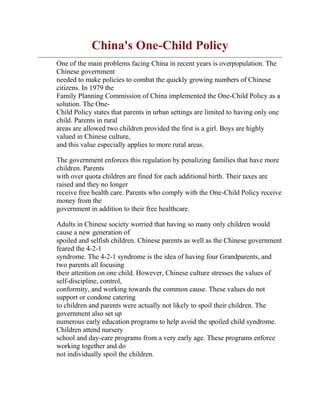
China's One-Child Policy: Controlling Population Growth Through Restrictions and Incentives
- 1. China's One-Child Policy One of the main problems facing China in recent years is overpopulation. The Chinese government needed to make policies to combat the quickly growing numbers of Chinese citizens. In 1979 the Family Planning Commission of China implemented the One-Child Policy as a solution. The One- Child Policy states that parents in urban settings are limited to having only one child. Parents in rural areas are allowed two children provided the first is a girl. Boys are highly valued in Chinese culture, and this value especially applies to more rural areas. The government enforces this regulation by penalizing families that have more children. Parents with over quota children are fined for each additional birth. Their taxes are raised and they no longer receive free health care. Parents who comply with the One-Child Policy receive money from the government in addition to their free healthcare. Adults in Chinese society worried that having so many only children would cause a new generation of spoiled and selfish children. Chinese parents as well as the Chinese government feared the 4-2-1 syndrome. The 4-2-1 syndrome is the idea of having four Grandparents, and two parents all focusing their attention on one child. However, Chinese culture stresses the values of self-discipline, control, conformity, and working towards the common cause. These values do not support or condone catering to children and parents were actually not likely to spoil their children. The government also set up numerous early education programs to help avoid the spoiled child syndrome. Children attend nursery school and day-care programs from a very early age. These programs enforce working together and do not individually spoil the children.
- 2. The One-Child Policy dramatically reduced the number of births in China. Chinese families were traditionally large. The current rate of births is down to 1.8 children per woman. However, there are still many over-quota births especially in rural areas. Families that cannot afford the fines sometimes feel social and financial pressure to abandon the child. Abandonment is a punishable crime, but most are overlooked and go unpunished. Many Chinese children end up in orphanages or are adopted either within China or by families overseas. http://homeport.tcs.tulane.edu/~rouxbee/kids99/china1.html
